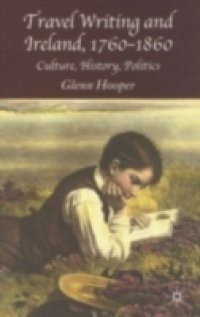Employing a wide range of travel and travel-related material from the period 1760-1860, this book offers new insights into the culture and history of late eighteenth and early nineteenth-century Ireland. It opens by exploring the development of the Home Tour as a rival to Grand Tour conventions, and assesses the ways in which Ireland deviated significantly from other Home Tour destinations. The book then focuses on the immediate Post-Union era which saw a dramatic increase in the number of, largely, British, travellers to the Irish shores, and considers the extent to which post-Union optimism lay behind a reawakened interest in Irish affairs. In later chapters the author offers an assessment of the period 1820-50, when older, negative representations of the Irish re-emerged, while in the final chapter he examines the role of the Post-Famine writer, frequently brought to Ireland to assess the economic and social state of the country, though also to sometimes speculate about a place increasingly regarded as ripe for investment and resettlement. A book which blends a number of case studies within a consideration of wider contextual matters, Travel Writing and Ireland, 1760-1860 should appeal to students and researchers from across the Humanities.

